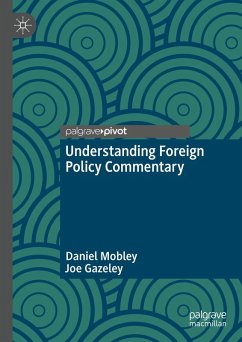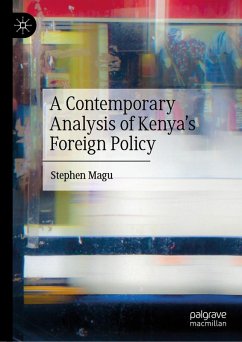
Professionalization of Foreign Policy (eBook, PDF)
Transformation of Operational Code Analysis
Versandkostenfrei!
Sofort per Download lieferbar
88,95 €
inkl. MwSt.
Weitere Ausgaben:

PAYBACK Punkte
44 °P sammeln!
This book identifies why presidents, prime ministers, and other leaders of countries often make blunders in foreign policy. Blunders have been recognized within the study of foreign policy, but no central methodology or theory has developed to provide a way to avoid future disasters. Options are often presented to leaders of countries by advisers who do not always assess which policies will best serve national interests. Presidents, prime ministers, and other leaders of countries then have their legacy judged accordingly.Therefore, the book reviews existing efforts at developing theories of fo...
This book identifies why presidents, prime ministers, and other leaders of countries often make blunders in foreign policy. Blunders have been recognized within the study of foreign policy, but no central methodology or theory has developed to provide a way to avoid future disasters. Options are often presented to leaders of countries by advisers who do not always assess which policies will best serve national interests. Presidents, prime ministers, and other leaders of countries then have their legacy judged accordingly.
Therefore, the book reviews existing efforts at developing theories of foreign policy to determine why they have failed. Instead of allowing a discipline with a lot of competing theories to continue to flounder, the book consolidates all approaches and develops a new professional format that will serve to professionalize foreign policy decision-making so that fewer key decisions are ever again considered blunders.
Therefore, the book reviews existing efforts at developing theories of foreign policy to determine why they have failed. Instead of allowing a discipline with a lot of competing theories to continue to flounder, the book consolidates all approaches and develops a new professional format that will serve to professionalize foreign policy decision-making so that fewer key decisions are ever again considered blunders.
Dieser Download kann aus rechtlichen Gründen nur mit Rechnungsadresse in A, B, BG, CY, CZ, D, DK, EW, E, FIN, F, GR, HR, H, IRL, I, LT, L, LR, M, NL, PL, P, R, S, SLO, SK ausgeliefert werden.












